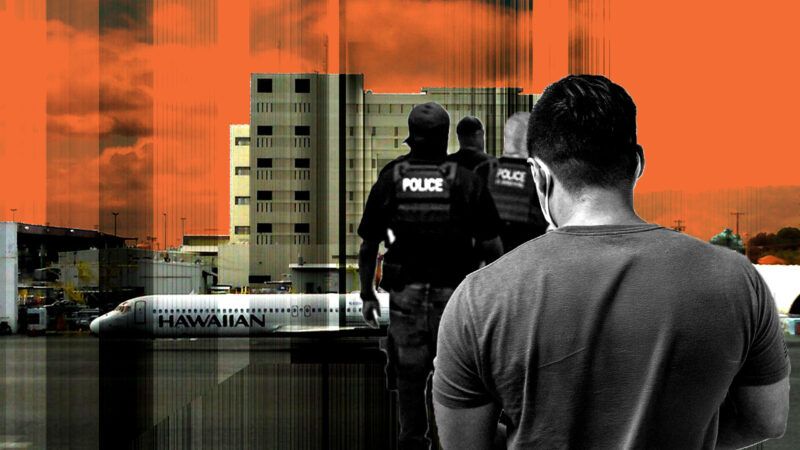ICE Is Shipping Detainees to Hawaii as Bed Space on the U.S. Mainland Fills Up
Immigrant detainees transferred thousands of miles from where they were first arrested face unique challenges in immigration court.

As the Trump administration moves to alleviate overcrowding in immigration detention centers, immigrant detainees are being transferred around the country, potentially thousands of miles from their families. Now, immigration attorneys in Honolulu are serving a new kind of client: immigrants arrested on the U.S. mainland with no connection to the island, Honolulu Civil Beat reports.
Immigration and Customs Enforcement (ICE) reached a record-high number of 57,861 detainees in late June amid President Donald Trump's immigration crackdown. To meet Trump's deportation goals, the administration has experimented with controversial methods of detaining immigrants in both state-run detention facilities, like Florida's Alligator Alcatraz, and other countries, like El Salvador. Another option is the Federal Bureau of Prisons (BOP), which agreed in February to set aside bed space across nine facilities, including at Federal Detention Center (FDC) Honolulu.
Data show that FDC Honolulu, along with facilities in Miami, Atlanta, Philadelphia, and Leavenworth, Kansas, have seen an increasing number of ICE detainees since the agreement. No data is currently available for the other four facilities in Los Angeles, Berlin, New Hampshire, Lewisburg, Pennsylvania, and Brooklyn, New York.
Once detained, ICE has broad discretionary authority to transfer immigrants to any detention facility, regardless of where the initial arrest took place. Although immigrants have the right to legal representation in immigration court, they do not receive a court-appointed attorney and must retain their own counsel. Transfers between detention facilities—like a 4,500-mile move from Florida to Hawaii—make it difficult for immigration lawyers to represent their clients.
"You can't video conference with them. They can't sign things. They can't review applications that you're going to submit on their behalf," Kevin Block, a Maui immigration attorney, told Civil Beat. "You really do need to be able to have face-to-face contact with them."
Even if a detainee has counsel, if the individual is transferred to another federal district court, they will have to find another attorney who practices in the location where they are being held. And while some courts allow remote hearings, having an attorney unfamiliar with an immigration judge and district practices puts detainees at a disadvantage.
Moving detainees can also cause due process concerns. Neribel Chardon, a pro bono immigration attorney in Hawaii, has a client who "was taken into custody in Florida and went to two detention centers there before he was transferred to Louisiana, Arizona and two facilities in California before finally coming to Hawaii," according to Civil Beat. Although her client was detained on May 4, he wasn't served his charging document until his court date in Honolulu "sometime in the last month." Any challenges to the validity of the charging document, potentially nullifying the charge, can not move forward until the document is first received.
ICE is currently laying the groundwork to provide an additional 100,000 beds and detain more immigrants. Todd Lyons, acting director of ICE, sent a memo on July 8 directing officers to detain immigrants who entered illegally "for the duration of their removal proceedings," no matter how long they've lived in the United States. This new policy could quickly fill those additional beds—potentially for years while cases move through immigration court. Given that the BOP's average cost to incarcerate an inmate was $120.80 per day in FY 2023, and that Americans are now on the hook for $45 billion to house additional immigrants, taxpayers are sure to foot a high bill for the federal government's mass detention protocol.
But the cost of federal immigration enforcement goes beyond dollars. Although the Trump administration claims that ICE detainees are "actually terrorists, human rights abusers, gangsters, and more," nearly half of those in ICE custody as of late June did not have a criminal conviction or pending criminal charges. Detaining individuals who pose no threat to public safety, especially amid serious questions about due process to meet Trump's mass deportation goals, will only serve to degrade constitutional protections for all Americans.


Show Comments (79)